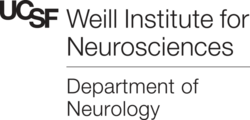About
Program Description
The UCSF Epilepsy fellowship program was established in 1976 and was part of the Clinical Neurophysiology program until 2015, when it became a stand-alone Accreditation Council for Graduate Medical Education (ACGME)-accredited program. The program has trained over 60 adult and pediatric epileptologists. This fellowship aims to train individuals in the evaluation and management of people living with epilepsy, to be skilled in the interpretation of electroencephalography (EEG), and to be comfortable caring for the most complex epilepsy cases. There are separate training tracks for Adult and Pediatric Epilepsy Fellows. This is a one-year program, with an optional second year of training available for those who are interested in pursuing further academic projects.
Program certifications: This program is accredited by the ACGME. The UCSF Epilepsy Center is accredited by the National Association of Epilepsy Centers (NAEC) as a level 4 epilepsy center. The Neurodiagnostic Lab is accredited in EEG and long-term monitoring (LTM) by the American Board of Registration of EEG/Evoked Potential Technologists (ABRET).
Mission
The goal of our fellowship program is to develop world-class epileptologists who become leaders in the field. The fellowship provides trainees ample opportunities to work with passionate and dedicated faculty while caring for the most complex patients living with epilepsy. Our graduates have made lasting contributions to the field of epilepsy: through excellent clinical care, groundbreaking research, innovations in treatment, and education of future neurologists.
Training Details
The fellowship provides multiple avenues for education and training, allowing fellows to achieve these academic and clinical objectives. Clinical rotations include inpatient care on the epilepsy monitoring unit, outpatient epilepsy clinic, interpretation of both scalp and intracranial EEGs. Fellows also participate and present in our multidisciplinary epilepsy surgery, neuropathology, and morbidity and mortality conferences, as well as journal clubs. Formal didactics are scheduled weekly.
The second year of the training program has two main tracks, chosen by fellows with guidance from the program director and other supervising faculty:
Clinical track: this program is based on the clinical interests of the fellow and subscribes to the ACGME tenet of progressive responsibility. The second-year fellow assumes a junior attending role with greater independence in patient management in both outpatient and inpatient settings. The second-year fellow will focus on the planning and management of phase 2 (intracranial) epilepsy surgery cases, the collaboration with the epilepsy surgeon during intraoperative electrocorticography, and leading epilepsy surgery case conference for the most complicated cases.
Research track: Under the supervision of the program director and with guidance from the Epilepsy director and research mentors, fellows identify appropriate translational, bench or clinical research projects and funding mechanisms during the first year of their epilepsy fellowship. Fellows who select this track must have successfully applied for intramural or extramural funding support, developed a project with clearly delineated specific aims, hypotheses and study design, and identified appropriate mentors by the end of their first year.
Facilities/Training Sites
University of California, San Francisco, Parnassus Heights and Mission Bay campuses, San Francisco Veterans Administration Medical Center
How to Apply
Prerequisites
Application Process
Applicant Dates
Contact Us
Manu Hegde, MD PhD (Program Director)
Helena Khim (Program Coordinator) : 415-476-9202; Fax: 415-476-3428
